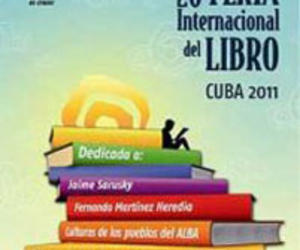Cuba's celebration of books draws millions
- Submitted by: manso
- Editorial Articles
- 02 / 21 / 2011

February 21, 2011, 12:26am. HAVANA (AP) – A river of people flows through the old colonial fortress, and the antics of clowns and music blasting from loudspeakers are interrupted only when an announcer summons the parents of a lost child. It's a festival all right, but a festival of books.
The high walls of El Morro and La Cabana, which offer a spectacular view of Havana's bay, house a giant celebration that mingles literary chitchat with an exuberant popular fair where some 6 million visitors socialize, browse for sandwiches of sizzling pork and scramble for novels, essays and scientific tomes.
With an illiteracy rate near zero, Cuba boasts that its International Book Fair — which turns 20 this year — has little in common with what it calls more elitist events in the Americas and Europe.
"This fair is oriented toward the reader ... as a chance to acquire books and have a dialogue with the authors, both Cubans and foreigners," organizer Edel Morales told The Associated Press.
"It is a notable difference to others in the world where people rarely attend," he said. "Here it is the people who make the fair."
Still, what sets the fair apart also presents some challenges.
The absence of a "professional segment" of meetings between critics, large publishing houses and other experts is one of its shortcomings, Morales acknowledged.
The event catalog lists more than 60 national exhibitors including publishers and regional cultural centers. All share one characteristic: They either are run by the state or have strong ties to the government.
About 30 foreign publishers have also turned out. Most are small and some are financed by the nations honored at this year's festival: the leftist ALBA bloc that includes Cuba, Venezuela, Ecuador and Bolivia.
Zuleica Romay, president of the Cuban Book Institute said 2,400 titles are for sale and an estimated 6 million people, counting return visitors, will attend, either during the Havana run that ends Sunday or during a two-week tour of the country's provinces.
The most-visited pavilion appeared to be one offering local volumes on everything from art and literature to social sciences, alternative medicine and biographies at prices attractive to Cubans who love to read but often finds books hard to find.
"I come every year. It is good to walk through and get books that are not always available," said Nadira Reyes, a 30-year-old teacher who was looking for colorful books with animals gracing the covers for her preschool-age son.
A few yards (meters) away, Yadriana Torres, 20, wanted books on beauty and massage, which she is studying.
"The problem is that they are expensive, because the most interesting in my field are sold in foreign currency," Torres said. The book that caught her eye cost 25 convertible pesos, or $27 — more than the average monthly salary in Cuba.
Reyes was headed for a pavilion that offered mostly local books in the local currency, a peso that is worth a little under 5 cents. Torres was lined up for one that sells in "convertible pesos," which are worth just over a dollar.
Many local books are made of modest paper, simple printing and soft, rustic binding, and they usually are heavily subsidized.
A good example is one of the most anticipated items of this year's fair: "The Man Who Loved Dogs," by Cuban writer Leonardo Padura, published last year by Spanish publisher Tusquets Editores. It sells for $24 elsewhere in the world, but islanders were able to buy it for just 30 Cuban pesos ($1.40) when it went on sale this month.
Some complaint that important books by several major writers are almost unavailable. This year's fair had no presentation of works by Latin America's new Nobel Prize winner, Mario Vargas Llosa, who is a sharp critic of Cuba's communist government.
Organizers said they did not have the rights to print the books and denied any political motivations.
Despite the difficulties, foreign editors from small companies said it was worth the trip.
"I am excited to see so many people," said Abigail Garrido of Urano Mexico, which brought 35,000 copies of its publications, mostly novels like the Dan Brown best-sellers "The Da Vinci Code" and "Angels & Demons."
"We sell more here than in any book fair in my country," Garrido added. "I think that for small publishers, it is a good opportunity."
Garrido said her company isn't making a profit on the fair due to the low prices. But it's important "visibility," she said.
When the book fair wraps up, the island will also benefit. Some publishers donate unsold merchandise to libraries and schools.
Source: www.mb.com.ph/articles/305408/cubas-celebration-books-draws-millions
Comments